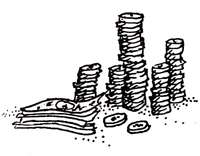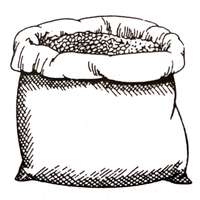SUPPLEMENTAL CURRENCY. Currency serves two uses in a community. It buys goods and services from outside the community. Until then, it recirculates  within the community making economic activity possible. A common lament heard throughout much of our overseas network is, "It just makes no sense. Willing labor goes unused and local produce and goods unsold because no one in the community has money. This remote area has so little to 'export' out of the region that very little money comes in to it."
within the community making economic activity possible. A common lament heard throughout much of our overseas network is, "It just makes no sense. Willing labor goes unused and local produce and goods unsold because no one in the community has money. This remote area has so little to 'export' out of the region that very little money comes in to it."
A missionary once told me, "Even if our projects had no effect themselves, the ripple effects of the money we spend recirculating in the community is in itself an enormous value." In my less restrained thinking, I have pondered, "If all this productive potential sits unusedfor lack of currency, then why not create a local currency, valueless except for goods and services in that community?" The idea seemed intriguing, far out and probably illegal.
You can imagine my surprise to read in the September 1993 issue of Mother Earth News that two years ago a group in the community around Ithaca, New York (the location of Cornell University) created a supplemental currency called HOURS. A one HOUR note is worth one hour of labor, or its equivalent in "barter" for other goods and services. It is accepted by an increasing number of people (laborers, farmers market vendors, baby sitters, hair dressers), and businesses such as restaurants. One credit union even accepts HOURS for deposits, though not with any equivalency with dollars.
Supplemental currency may well be illegal in the country where you work, and it is still a "far out" idea. But it is sure a fascinating article. You can order a Hometown Money Starter Kit, including forms, laws, barter articles, past and future issues of their newsletter, sample currency for about $25 (in US dollars!) from the group that started the Ithaca project: Ithaca Money, Box 6578, Ithaca, NY 14851, USA.>
 MARKETS SATURATED WITH FREE GRAIN. A questionnaire that ECHO sent to its "network" asked, "What are your most frustrating problems?" A missionary in Africa replied, "Free food distribution that puts the local farmers out of business." Where drought or war has resulted in famine such relief is important. However, we need to be very careful before handing out free commodities on a large scale. [The following example is excerpted from Rurcon News by Peter Batchelor, 4 Churchfield, Wincanton, Somerset BA9 9AJ, England.] "All too frequently one hears of well-meaning aid agencies getting grain to needy areas so late that the free gifts coincide with the harvest from local farmers. In 1984 farmers in Chad only produced 58% of the country's grain requirements, so tons of food aid were needed. In 1985 about 114% of needed food was produced in-country, but food aid continued. In March 1986, 1000 tons of grain were released by FAO in Bongor. Grain prices dropped from about 50 pence a kilo to 5 pence. Farmers thus have no incentive to grow more than their families require and there could well be another famine on the way. An alternative to dumping grain is to store it. Good grain silos at family, community and regional levels should be a priority." If you are a Christian missionary in Africa you should ask to receive Peter's newsletter; write RURCON, Nigeria Bible Translation Centre, Old Airport Road, P.O. Box 6617, Jos, NIGERIA. Much of his time is spent in personally visiting missionaries. I believe his special expertise is in ways to work with small third world farmers. He might even show up at your door some day!
MARKETS SATURATED WITH FREE GRAIN. A questionnaire that ECHO sent to its "network" asked, "What are your most frustrating problems?" A missionary in Africa replied, "Free food distribution that puts the local farmers out of business." Where drought or war has resulted in famine such relief is important. However, we need to be very careful before handing out free commodities on a large scale. [The following example is excerpted from Rurcon News by Peter Batchelor, 4 Churchfield, Wincanton, Somerset BA9 9AJ, England.] "All too frequently one hears of well-meaning aid agencies getting grain to needy areas so late that the free gifts coincide with the harvest from local farmers. In 1984 farmers in Chad only produced 58% of the country's grain requirements, so tons of food aid were needed. In 1985 about 114% of needed food was produced in-country, but food aid continued. In March 1986, 1000 tons of grain were released by FAO in Bongor. Grain prices dropped from about 50 pence a kilo to 5 pence. Farmers thus have no incentive to grow more than their families require and there could well be another famine on the way. An alternative to dumping grain is to store it. Good grain silos at family, community and regional levels should be a priority." If you are a Christian missionary in Africa you should ask to receive Peter's newsletter; write RURCON, Nigeria Bible Translation Centre, Old Airport Road, P.O. Box 6617, Jos, NIGERIA. Much of his time is spent in personally visiting missionaries. I believe his special expertise is in ways to work with small third world farmers. He might even show up at your door some day!